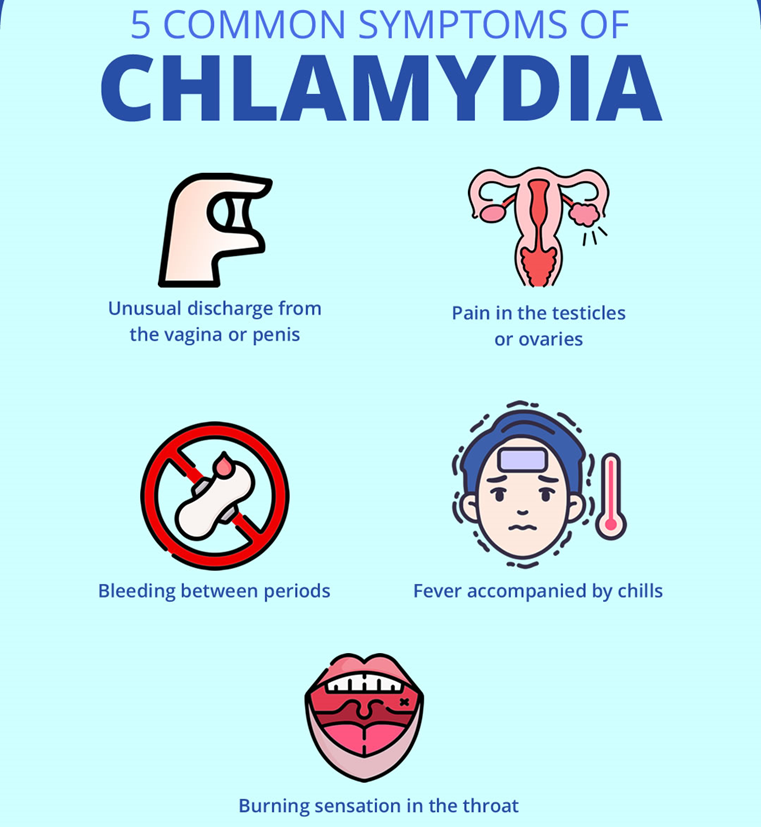A nurse at a local health department is caring for several clients. Which of the following infections should the nurse report to the state health department?
Chlamydia.
Herpes simplex virus.
Group B Streptococcus B hemolytic.
Human papillomavirus.
The Correct Answer is A
Choice A reason: Chlamydia is a reportable infection to the state health department. Chlamydia is a sexually transmitted infection caused by the bacterium Chlamydia trachomatis. It can cause pelvic inflammatory disease, infertility, ectopic pregnancy, and neonatal complications. Reporting chlamydia cases can help to monitor the prevalence, incidence, and trends of the infection, and to implement prevention and control measures.

Choice B reason: Herpes simplex virus is not a reportable infection to the state health department. Herpes simplex virus is a common viral infection that causes oral or genital lesions. It can be transmitted through direct contact with the lesions or the infected fluids. There is no cure for herpes simplex virus, but antiviral medications can reduce the frequency and severity of the outbreaks.
Choice C reason: Group B Streptococcus B hemolytic is not a reportable infection to the state health department. Group B Streptococcus B hemolytic is a type of bacteria that can be found in the gastrointestinal or genital tract of some people. It can cause serious infections in newborns, pregnant women, and people with weakened immune systems. Screening and treatment of pregnant women can prevent the transmission of the bacteria to their babies.
Choice D reason: Human papillomavirus is not a reportable infection to the state health department. Human papillomavirus is a group of viruses that can cause warts or cancers in different parts of the body. It can be transmitted through sexual contact or skin-to-skin contact. There is no treatment for human papillomavirus, but vaccines can prevent some types of the virus that cause cervical cancer and genital warts.
Nursing Test Bank
Naxlex Comprehensive Predictor Exams
Related Questions
Correct Answer is C
Explanation
Choice A reason: Having the client's daughter communicate information about the procedure is not an action that the nurse should take. The daughter may not be a reliable or accurate interpreter, as she may have limited language skills, lack medical knowledge, or be influenced by her emotions or biases. The nurse should use a qualified interpreter who can ensure the confidentiality, accuracy, and completeness of the communication.
Choice B reason: Arranging for a member of the client's community to interpret the teaching is not an action that the nurse should take. The member of the client's community may not be a qualified or impartial interpreter, as he or she may have a personal or professional relationship with the client, or may have a conflict of interest or a hidden agenda. The nurse should use a professional interpreter who can maintain the boundaries, objectivity, and neutrality of the communication.
Choice C reason: Identifying the client's spoken dialect prior to contacting an interpreter is an action that the nurse should take. This will help the nurse to find an appropriate interpreter who can communicate effectively and respectfully with the client. The nurse should also consider the client's cultural background, preferences, and needs when selecting an interpreter.
Choice D reason: Using professional terminology when providing education prior to the procedure is not an action that the nurse should take. The nurse should use simple and clear language that the client can understand, and avoid using jargon, slang, or idioms that may confuse or offend the client. The nurse should also check the client's comprehension and ask for feedback throughout the communication.
Correct Answer is C
Explanation
Choice A reason: Administrator is not the role that the nurse is functioning in when arranging for an occupational therapist to visit the client. An administrator is a nurse who is responsible for planning, organizing, directing, and controlling the delivery of health care services within an organization or a unit.
Choice B reason: Nurse consultant is not the role that the nurse is functioning in when arranging for an occupational therapist to visit the client. A nurse consultant is a nurse who provides expert advice and guidance to clients, organizations, or other health care professionals on specific issues or problems.
Choice C reason: Case manager is the role that the nurse is functioning in when arranging for an occupational therapist to visit the client. A case manager is a nurse who coordinates the care of a client across the continuum of health care settings and services. A case manager assesses the client's needs, develops a plan of care, facilitates the delivery of appropriate interventions, and evaluates the outcomes.
Choice D reason: Clinician is not the role that the nurse is functioning in when arranging for an occupational therapist to visit the client. A clinician is a nurse who provides direct care to clients in various settings, such as hospitals, clinics, or homes. A clinician performs assessments, diagnoses, treatments, and evaluations of the client's health status.
Whether you are a student looking to ace your exams or a practicing nurse seeking to enhance your expertise , our nursing education contents will empower you with the confidence and competence to make a difference in the lives of patients and become a respected leader in the healthcare field.
Visit Naxlex, invest in your future and unlock endless possibilities with our unparalleled nursing education contents today
Report Wrong Answer on the Current Question
Do you disagree with the answer? If yes, what is your expected answer? Explain.
Kindly be descriptive with the issue you are facing.
